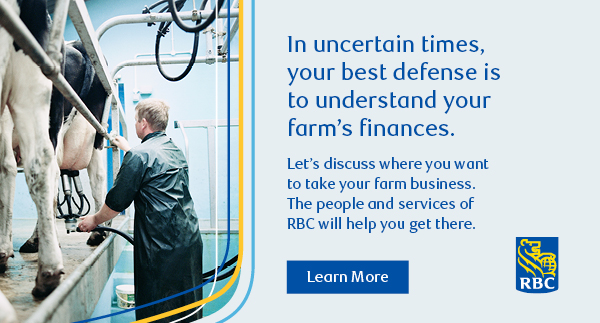|
 |
| |

|
| |
|
Hands-up if the words global pandemic appeared in the risk management section of your farm business plan heading into 2020.
|
| |
|
There won’t be many takers. In fact, COVID-19 has had such an immense impact precisely because it was so unexpected.
|
| |
|
Ryan Riese gives Canadian farmers huge credit for weathering the storm – and he knows how they did it.
|
| |
|
| |
|
“Our clients, and a lot of producers generally, have strongly bought into making risk management a focal point of their business strategy. Each farm has its own approach to preparing for an unforeseen event. When it happens, they know what to do.”
|
| |
- Ryan Riese,
National Director, Agriculture Strategy, RBC.
|
| |
|
| |
|
Riese sees three elements as the basis of contingency planning: understanding your current financial position, knowing how it developed in recent years and setting direction for your near-term future.
|
|
|
|
Many producers have developed close relationships with professional advisors. In many cases, they also meet with peer groups of fellow farmers and participate in government risk management programs.
|
| |
|
“If you have access to these different resources and viewpoints, when unexpected events arise, you know what that means to you financially,” says Riese. “When you need to make big decisions during uncertain times, having a solid plan in place can give you a lot of comfort.”
|
| |
|
In that sense, a key asset for Canadian farmers this year has been a flexible mindset and a disciplined approach to managing risk.
|
| |
|
“The way that agriculture has responded so far says a lot about the strength and preparedness of our industry,” says Riese. “That should give us confidence about the future -- whatever challenges it might bring.”
|
|
|
| |
|
|
| |
|
| | |

